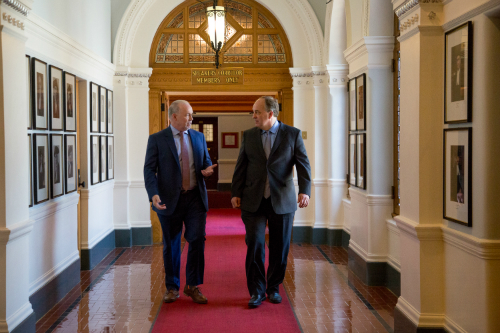
In 2013, after Christy Clark’s unexpected election win, we wrote a post about what environmental wins we might expect from her new government. So now, in 2017, after another surprising election result culminating in the announcement that the BC NDP and BC Greens will cooperate to bring down her government, it makes sense to look forward to what we might expect on the environmental law front from a BC NDP government (supported by the Greens).
Some things are obvious
The BC NDP and BC Greens have publically released the agreement that sets the foundation for their cooperation. The media has done a good job in highlighting some key environmental commitments in the NDP/Green agreement. These include:
- The government will do everything in its power to stop the Kinder Morgan Pipeline;
- The Site C dam will be referred to the BC Utilities Commission for an independent review;
- The leaders have committed to increase the carbon tax (although, frankly, the BC Liberals had committed to do that too, even if they tried to pretend otherwise).
Also prominent in the reporting of this agreement are the commitments to ban big money from BC politics and hold a referendum on proportional representation.
But wait, there’s more
That’s not all that’s in the NDP/Green agreement. Here are a few commitments that you may have missed unless you’ve been paying close attention.
- A new Climate Action Strategy – In addition to increasing the carbon tax by $5/tonne each year from 2018 to 2022 (bringing it to the national minimum of $50/tonne), the government will “implement a climate action strategy to meet our targets.” It seems likely that this will involve re-convening the province’s Climate Leadership Team, as previously pledged by the NDP.
- Improved public transit and funding for public transit – The NDP seems to see transit as advancing both its climate and economic goals.
- A focus on the new Emerging Economy – BC’s global competitive economic advantage may well lie in its high proportion of renewable energy (over 90% hydro), pristine wilderness and green reputation. But can the new government turn those assets into real jobs and economic growth? They aim to try, promising to create an Emerging Economy Task Force to develop “made-in-BC” solutions, as well as an Innovation Commission to support BC’s technology sector. In addition, the government hopes to redefine the way it measures wealth through the development of a “genuine progress indicator” that measures different types of wealth (presumably including environmental wealth).
- Reinvigorating the forest sector – Although details are lacking, the agreement commits to “improve both environmental standards and jobs for local communities.” Party leaders John Horgan and Andrew Weaver have mentioned the importance of the forest sector. The NDP Platform emphasized value-added forestry, and it is encouraging to see a recommitment to environmental protection in the agreement.
- New commitments to First Nations– The agreement describes commitments to First Nations as “a foundational piece of this relationship.” In particular, the government will “review policies, programs and legislation” to determine how to bring the principles of the UN Declaration on the Rights of Indigenous Peoples “into action in BC.”
- Better environmental decision-making. There has been some media discussion of the pledge to “revitalize the Environmental Assessment process in BC,” but we’ve seen little mention of the parallel pledge to “address failures in the professional reliance model,” which has seen government off-load the responsibility of protecting the public to industry-hired professionals.
One suspects that new Green MLA Sonia Furtesnau may have played a role in highlighting professional reliance – since her community’s fight against the a dump in the Shawnigan Lake watershed was a poster-child for why you can’t simply trust professionals hired by a developer to do the right thing.
We’re excited about both of these developments in environmental law and environmental decision-making, which create real opportunities to look at the needs of our communities and the environment before leaping into potentially dangerous projects. This is especially so given that the platforms of both the BC NDP and BC Greens commit to better management of the cumulative effects of development.
Beyond what’s in the agreement
This would be a pretty aggressive list of environmental priorities for any government. But the agreement does not prevent the two parties from delivering on other promises in their individual platforms. As the senior partner, the NDP’s platform is especially relevant, and it includes:
- Banning the grizzly bear trophy hunt;
- Enacting endangered species legislation;
- Restoring funding for BC Parks;
- Hiring new conservation officers and park rangers;
- Implementation of the Cohen Commission recommendations to protect wild salmon from aquaculture;
In addition to (or perhaps as part of) reforming environmental decision-making, the NDP pledged to “modernize land-use planning to effectively and sustainably manage BC’s ecosystems, rivers, lakes, watersheds, forests and old growth, while accounting for cumulative effects;”
- Appointing a panel to assess the safety of hydraulic fracturing (fracking) in oil and gas development;
- Banning cosmetic pesticides;
- Recognizing a public right to safe, clean drinking water;
- Re-vitalizing energy efficiency programs; and
- Protecting free speech through anti-SLAPP laws and whistleblower protection laws.
And that doesn’t count environmental initiatives that the BC Greens and/or the BC Liberals might bring forward in a minority government situation. You can check out their platforms here (Greens) and here (Liberals).
A note of caution
We don’t have an NDP minority government yet, and if and when we do, the majority will be razor-thin. There is a lot of skepticism that this government will last a full four years. However, based on the NDP/Green agreement, and on the NDP Platform, we have reason to hope that a number of significant environmental initiatives may be on the table.
Tell us in the comments below what environmental initiatives you’re most hoping to see in the coming four years.
Photo by the BC NDP, used under a Creative Commons Licence